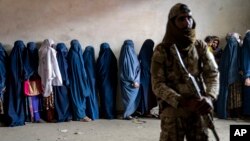The “grave, systematic and institutionalized discrimination” imposed by the Taliban on Afghanistan’s female population may amount to gender apartheid, according to U.N. Special Rapporteur on the Situation of Human Rights in Afghanistan, Richard Bennett. “If one applies the definition of apartheid, which at the moment is for race, to the situation in Afghanistan and use sex instead of race, then there seem to be strong indications pointing towards that," he told the U.N. told the Human Rights Council in Geneva.
“The United States again condemns the Taliban’s restrictions on women and girls’ ability to exercise their human rights. These restrictions are indefensible. They are not seen anywhere else in the world. We call for the immediate reversal of these restrictions,” said United States Alternative Representative for Special Political Affairs, Robert Wood.
“In April, the Security Council adopted Resolution 2681, the third resolution on Afghanistan adopted unanimously this year. Over 90 UN member states co-sponsored this resolution. It sent a clear message to the Taliban, to the Afghan people, and to the world: We will not stand for the Taliban’s repression of women and girls,” he said.
Indeed, the Taliban’s restrictions on women are aggravating the humanitarian crisis in Afghanistan. Its prohibition on women working for NGOs is impeding humanitarian operations in the country. Also, donors are less willing to fund desperately needed aid.
“The international community averted relief actors’ worst predictions of widespread famine in 2021,” said Ambassador Wood. “This year, however, we can already see the impact of reduced international support for Afghanistan, with the closure of women-led NGOs, ration cuts, and reductions to the number of food-assistance beneficiaries.”
“Despite obstacles and competing global priorities, we cannot turn our backs on the Afghan people’s growing humanitarian needs,” said Ambassador Wood. “As the world’s largest humanitarian donor, the United States will continue to do its part to support the people of Afghanistan.”
“We will also carefully watch the Taliban’s actions on the commitments they have stated they will uphold. We continue to expect the Taliban to allow unhindered humanitarian access, safe conditions for aid workers of all genders, and independent and impartial provision of assistance,” he said. “The Taliban must respect the human rights of all Afghans.”
“We look to the Taliban to codify these principles in their policies and to demonstrate them with their actions,” said Ambassador Wood. “As the meeting of Afghan special envoys showed, so too does the rest of the world.”














